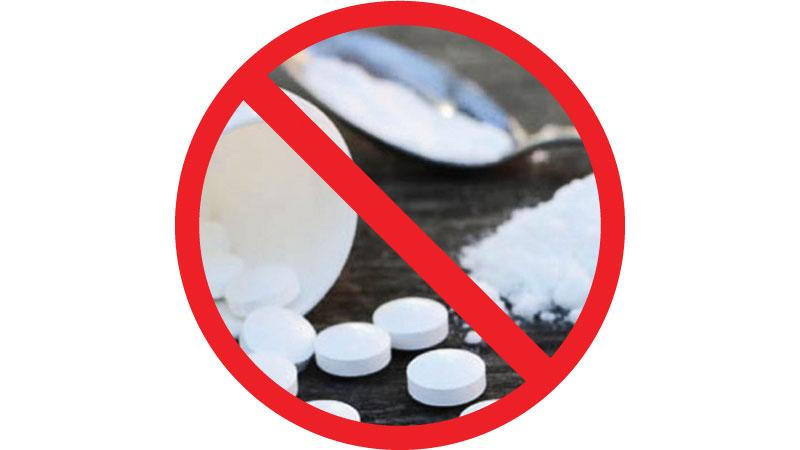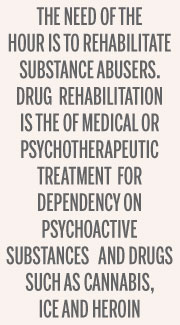
News reports in the past few days have been replete with shocking revelations of our tiny island nation being flooded with new drugs illegally smuggled from neighbouring countries by organised drug mafia who distribute them to identified carriers eager for a fast buck. Reports have revealed that many of these carriers are women of varying ages, themselves addicted to drug abuse, or single mothers forced to engage in this dangerous business to support their families.
 Prof Ravindra Fernando |
A recent report that over 553,000 Lankans are addicted to drugs, accompanied by Police reports that there were 25 underworld gangs operating in Colombo alone no doubt calls for stricter implementation of existing drug laws, especially, with news that many young women are now getting hooked on drugs and experimenting with new narcotics, such as ICE, Mandy, Bubble which are increasingly making their way to popular entertainment venues. To cite a recent example, several arrests made at recent ‘facebook’ parties revealed a number of young girls aged 17 upwards using the newest addictive drug ICE.
The Sunday Observer spoke to Emeritus Professor of Forensic Medicine and Toxicology, University of Colombo and Senior Prof. Forensic Medicine, General Sir John Kotelawala Defence University, and former Chairman, National Dangerous Drugs Control Board Prof Ravindra Fernando who has long spearheaded the war against drug abuse, on his views with regard to women engaging in drug experimentation and the impact on their health. We also asked him how drug use could be halted in keeping with the government policy to eradicate the menace soon.
Excerpts:
Q. More women are now indulging in drug experimentation using new drugs that have entered the country. Tell us how this could impact on their health. Are the effects the same as for men?
A. Women face unique issues when it comes to substance use, in part influenced by firstly sex (differences based on biology) and secondly, gender (differences based on culturally defined roles for men and women).
According to scientists who study substance use, women who use drugs can have issues related to hormones, menstrual cycle, fertility, pregnancy, breastfeeding, and menopause.
Q. Are the reasons for women using substances different from those of their male counterparts?
A. Most women we have seen have revealed that the reasons for using drugs, included controlling weight, fighting exhaustion, coping with pain, and attempts to self-treat mental health problems, reasons which are unique to women.
Q. Is the quantity of substances and the way they use them different from males?
A. Women often use substances differently from men, e.g. using smaller amounts of certain drugs for less time before they become addicted.
Q. What about their response to substance use? Is it the same as for male users?
 A. Women can respond to substances differently. For example, they may have more drug cravings and may be more likely to relapse after treatment, which is a great problem.
A. Women can respond to substances differently. For example, they may have more drug cravings and may be more likely to relapse after treatment, which is a great problem.
Gender differences in rates of substance abuse have been consistently observed in the general population and treatment-seeking samples, with men exhibiting significantly higher rates of substance use, abuse, and dependence.
However, recent epidemiologic surveys suggest that this gap between men and women has narrowed in recent decades.
For example, surveys in the early 1980s estimated the male/female ratio of alcohol-use disorders as 5:1, in contrast to more recent surveys that report a ratio of approximately 3:1.
Q. What about the physical effects of these drugs on them?
A. Women who use drugs may also experience more physical effects on their heart and blood vessels. Brain damage in women who use drugs can be different from those in men.
Women who use certain substances may be more likely to have panic attacks, anxiety, or depression.
Sex hormones can make women more sensitive than men to the effects of some drugs. Women may be more likely to go to the emergency room or die from overdose or other effects of certain substances. Women who are victims of domestic violence are at increased risk of substance use. Divorce, loss of child custody, or the death of a partner or child can act as triggers.
Q. What about pregnant women who take these narcotics? How does it affect them?
A. Substance use during pregnancy can be risky to the woman’s health and that of her children in both the short and long term. Most drugs, including opioids and stimulants, could potentially harm an unborn baby.
Use of some substances can increase the risk of miscarriage and can cause migraine, seizures, or high blood pressure in the mother, which may affect her fetus.
In addition, the risk of stillbirth is 2 to 3 times greater in women who smoke tobacco or marijuana, take prescription pain relievers, or use illegal drugs during pregnancy. Pregnant women or women wanting to get pregnant should stop using drugs.Pregnant women should check with their health care provider before using any medicines or substances.
When a woman uses some drugs regularly during pregnancy, the baby can go through withdrawal after birth, a condition called neonatal abstinence syndrome (NAS).
The type and severity of a baby’s withdrawal symptoms depend on the drug(s) used, how long and how often the mother used, how her body breaks down the drug, and whether the baby was born full-term or prematurely. Symptoms of NAS in a newborn can develop immediately or up to 14 days after birth.
Q. Briefly mention the common addictive drugs being used in Sri Lanka.
A. The commonest addictive or dependence producing drugs are alcohol and tobacco, both are legal in Sri Lanka.
Other common drugs are amphetamine, methamphetamine (Ecstasy) and ICE. Cannabis or ganja or marijuana, heroin. cocaine and benzodiazepines and similar drugs are also abused.
Other addictive drugs include barbiturates, hallucinogens (lysergic acid diethylamide - LSD, certain mushrooms), khat type (a plant catha edulis, used mainly in North Africa), and volatile solvents.
Q. Which of these is most harmful?
 A. Methamphetamine. Meth is a powerfully addictive drug whose chronic use preferentially causes psychiatric complications.
A. Methamphetamine. Meth is a powerfully addictive drug whose chronic use preferentially causes psychiatric complications.
Chronic meth users have deficits in memory and executive functioning as well as higher rates of anxiety, depression, and most notably psychosis.
It is because of addiction and chronic psychosis from Meth abuse that the meth user is most likely to come to the attention of the practising Psychiatrist or Psychologist.
Q. What about ICE?
A. ICE, along with speed and base, is a form of the potent stimulant drug methamphetamine. It is also referred to as shabu, crystal, crystal meth or d-meth. ICE is the purest and most potent form of methamphetamine.
It comes as a powder or crystals that are usually snorted, injected or smoked.
About half of those who use methamphetamines say they prefer to take ICE. Methamphetamine psychosis typically involves feeling overly suspicious, having strange beliefs about things that are not plausible, or hearing and seeing things that are not there.
Q. Harmful effects?
A. ICE is far more potent than powdered methamphetamine, and as a result of its potency, it has a very strong effect on the body and can result in substance dependence.
ICE is highly addictive, stronger and causes more harmful side effects than the powder form. Some researchers consider crystal methamphetamine to be the most dangerous and destructive drug available today due to the devastating effects it has on the human body.
When ICE vapours are inhaled, they enter the bloodstream directly through the lungs and are rapidly transported to the brain.
Manifestations of acute over dosage with methamphetamine include restlessness, tremour, hyper-reflexia, rapid respiration, confusion, hallucinations, panic states and fever.
Fatigue and depression usually follow the central stimulation. Effects on the heart include rhythm changes, high or low blood pressure and circulatory collapse. Gastrointestinal symptoms include nausea, vomiting, diarrhoea, and abdominal cramps. Fatal poisoning usually terminates in convulsions and coma.
Q. As we are still amid the Covid-19 pandemic do you think users of illegal drugs are more vulnerable to this new virus?
A. Yes. Users of illegal drugs such as kerala ganja, cannabis and ICE can be vulnerable to the Covid-19 virus now spreading to all parts of the country, due to their already lowered immune systems.
Q. What do you think should be done to halt this disturbing trend?
A. The need of the hour is to rehabilitate substance abusers. Drug rehabilitation is the of medical or psychotherapeutic treatment for dependency on psychoactive substances and drugs such as cannabis, ICE and heroin.
The objective is to enable the patient to confront substance dependence and cease substance abuse to avoid the psychological, legal, financial, social, and physical consequences that can be caused by extreme abuse.
Treatment includes medication for depression or other disorders, counselling by experts and sharing of experience with other addicts. This is a costly, time consuming process.
Q. Role of parents? Teachers? Do you think more awareness raising is needed?
A. Definitely more awareness campaigns are required to educate parents and teachers to help prevent children becoming substance users.
Q. Your message to all young people especially young women on why experimenting with drugs can cause serious health impacts on them and their unborn children?
A. Never take or experiment with drugs. You do not know when you will end up as an addict.
